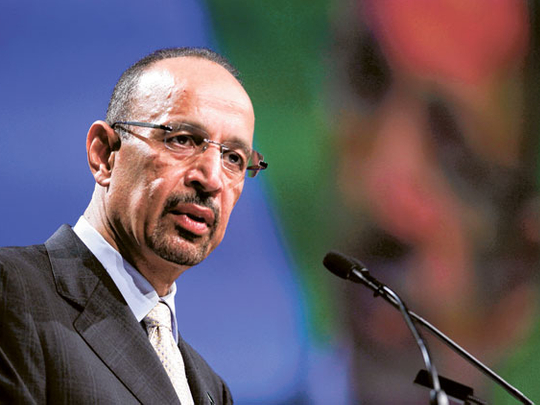
London: Oil prices turned lower yesterday as reassurances from Saudi Arabia that extra supply needs had been met soothed market fears over the spread of protests to oil-producer Oman.
Violent uprisings in Opec member Libya dramatically reduced exports from North Africa, but Saudi Aramco chief executive officer Khalid Al Falih told reporters yesterday that the shortfall had been made up.
Falih refused to give exact figures, but an industry source on Friday said the top exporter's output had risen to more than 9 million barrels per day (bpd). This compared with roughly 8.3 million bpd in January, according to a Reuters survey.
By 1049 GMT Brent futures for April were 3 cents lower at $112.11 (Dh411.7) a barrel. US crude was 1 cent down at $97.87 a barrel. Both benchmarks posted their highest weekly close in two-and-a-half years last week.
Not out of the woods yet
"Saudi Arabia saying they are replacing more or less what has been lost from Libya is calming the market this morning," said Cristin Tuxen, senior commodities analyst at Danske Bank, who warned prices could easily rally again if the situation in the Middle East deteriorated.
"We saw how nervous the market was when we saw the spike last week to $120 a barrel [for Brent]. It really highlights that the risk premia related to geo-politics in the region is changing hour by hour." Prices for both benchmarks had earlier jumped a dollar higher on the day as Oman became the latest producer to feel the impact of the regional unrest, although its oil flow has not been affected.
Omani oil is equivalent to about 1 per cent of global oil consumption, and any disruption could be expected to have an impact on oil prices.
Protesters blocked roads into the industrial area of Oman's refined product export port Sohar yesterday. Product shipments continued unhindered, a port spokeswoman said.
Oman produces around 850,000 bpd and its crude forms part of benchmark used to price more than 10 million bpd of crude shipped from the Middle East to Asia.
The uprising in Libya has shut in as much as three-quarters of its output of 1.6 million bpd, according to some estimates. Iran's oil minister urged Saudi Arabia on Sunday to refrain from taking a hasty decision on increasing its oil production after the popular uprising in Libya, the official IRNA news agency reported.
Iran is also selling more crude to refiners looking for alternatives to Libyan supplies.
Libya: Shipments halted
Crude oil shipments from Libya are at a virtual standstill as reduced production and bad weather hamper exports from the world's 12th largest producer, shipping sources said yesterday.
Colonel Muammar Gaddafi's forces have been trying for days to push back a revolt that has won control over eastern Libya and is holding the government at bay in cities near Tripoli.
Libya's Hamada oilfield has ceased production and the eastern fields of Sarir, Nafoora and Misla are producing at about half their normal capacity, an official said. Shipping sources said bad weather in the Mediterranean had meant at least four tankers carrying around 2.4 million barrels of crude oil were unable to either load or leave Libyan ports.












